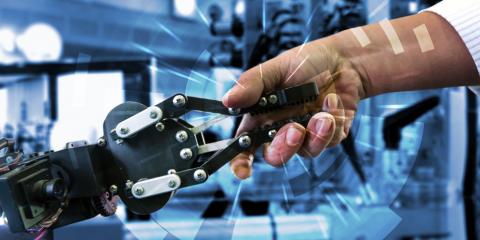5 building blocks of a corporate culture focussing on change

5 building blocks of a corporate culture focussing on change
Everyone will have understood by now that the fourth industrial revolution is no passing trend. The digitisation of products and production continues steadily. Companies that want to remain competitive have no alternative but to jump on the bandwagon. However, focussing on technological progress alone does not suffice. To be able to make a difference, companies must adapt their organisation and prepare their employees for the upcoming changes. Accordingly, the necessary changes are also reflected in the corporate culture. Innovation in the corporate culture consists of five building blocks.
1. X-AS-A-SERVICE business models
Companies often innovate their products or their production. This does not suffice. Innovation is about products, production and business models, all aligned with one another. Indeed, evolutions in consumer behaviour, globalisation and technological innovation open the door to new business models. Because products are connected in the Cloud, companies can add new features, carry through updates or schedule maintenance at any time.
As a result, customers will not necessarily purchase the physical product but the service delivered by that product and pay for its use. X-as-a-service business models are born. To make it a success, flexibility is necessary: from the customers as they will have to share their data and from companies as they will have to switch from sales to lease contracts.
2. PRODUCTION INNOVATION
Product innovation is usually regarded as a long-term investment. This is logical as it results in new products, improvements to an existing product or a new feature for an existing product. Product innovation creates visibility.
Production innovation is a lot less sexy. Improving processes may be time- and cost-efficient but does not generate revenues. That is why production innovation is usually considered as a short-term investment with an ROI of a few months. However, this mindset is completely outdated. A flexible, efficient production environment is based on optimal production processes. These are permanently improved so that resources are always deployed effectively and the costs for each order remain limited. This efficient production environment will, along with the product, become the distinguishing factor of companies.
3. Local market potential
Local production, close to the end customer, is gaining importance. Customers also want to have their product much faster than before. Digitisation allows for a significant reduction of the lead time. The time gained by this should not be lost on account of long delivery times. Therefore, a good digital strategy starts with a sound analysis of the local market potential and the definition of an appropriate business model.
4. Cooperation is key
This cooperation is found on many different levels:
- Customers expect customised products at the price of mass products and with short delivery terms. To be able to meet this market demand, businesses must switch rapidly. For this, an active and intensive cooperation between all departments of a company is key. This also requires an efficient flow of information between the different departments.
- The influx of new ideas enhances knowledge development, both internally and externally through the cooperation with other partners within the value chain, i.e. knowledge institutions, other companies and public authorities. Cooperation in ecosystems – with respect for IP – enables companies to keep up with the pace in which technological developments follow one another.
5. Man (and machine)
Men are crucial for unlocking the added value of digitisation. Still, there are two inhibiting factors. For many companies, recruiting technically trained personnel is one of their main challenges.
Change only works if everyone believes in it and understands its benefits.
On the other hand, operators experience changes in or even the complete disappearance of their role. An efficient digital strategy focuses on the cooperation between man and machine, with people feeling good about the tasks they must perform. This is the only way to realise the flexible production that the market demands. By taking into account the unique qualities of both, everyone will find his or her place in the bigger whole. Change only works if everyone believes in it and understands its benefits.
Companies must excel and accelerate in all areas at the same pace to be able to acquire a high level of digital maturity. By building foundations with these five building blocks, companies can ensure a solid basis for growth.
This article was first published in Bloovi.
